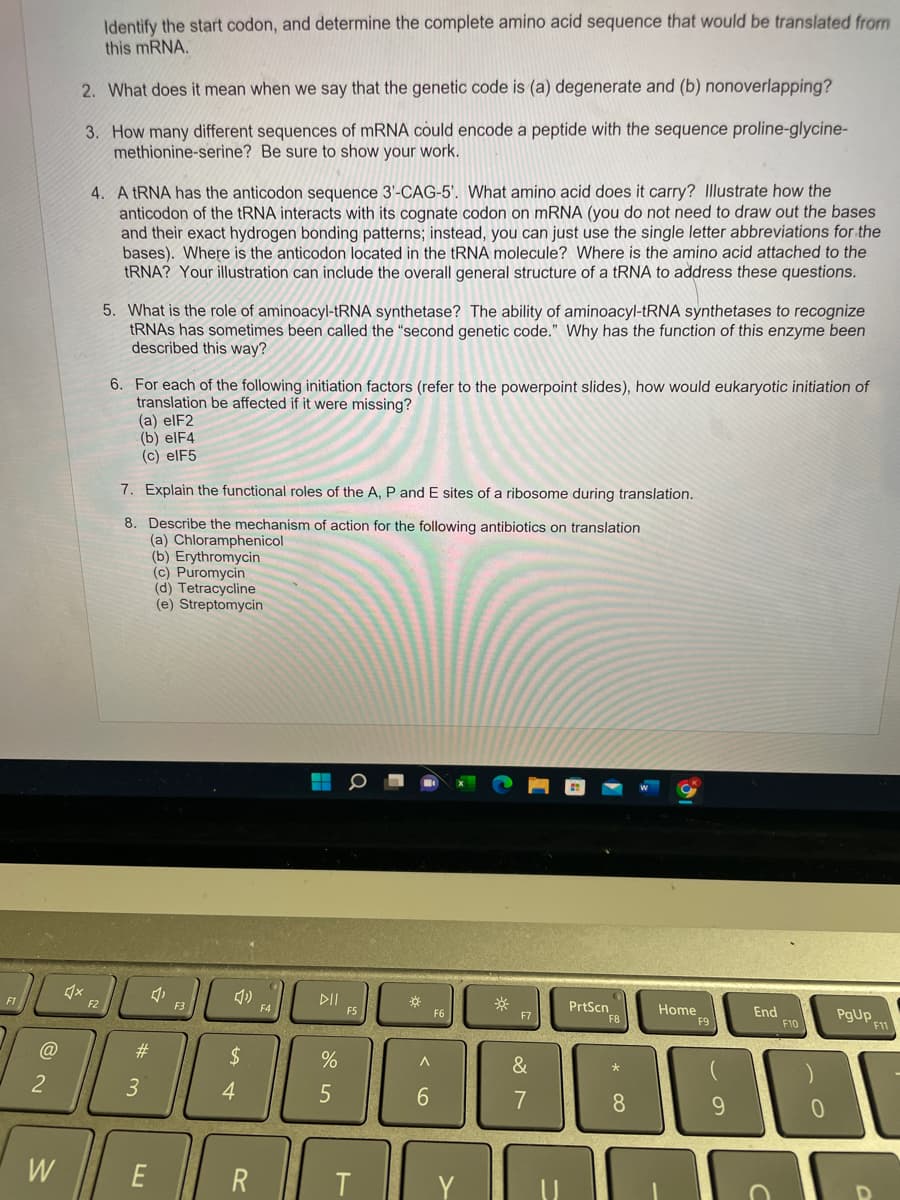4. A tRNA has the anticodon sequence 3'-CAG-5'. What amino acid does it carry? Illustrate how the anticodon of the tRNA interacts with its cognate codon on mRNA (you do not need to draw out the bases and their exact hydrogen bonding patterns; instead, you can just use the single letter abbreviations for the bases). Where is the anticodon located in the tRNA molecule? Where is the amino acid attached to the tRNA? Your illustration can include the overall general structure of a tRNA to address these questions.
4. A tRNA has the anticodon sequence 3'-CAG-5'. What amino acid does it carry? Illustrate how the anticodon of the tRNA interacts with its cognate codon on mRNA (you do not need to draw out the bases and their exact hydrogen bonding patterns; instead, you can just use the single letter abbreviations for the bases). Where is the anticodon located in the tRNA molecule? Where is the amino acid attached to the tRNA? Your illustration can include the overall general structure of a tRNA to address these questions.
Biology: The Dynamic Science (MindTap Course List)
4th Edition
ISBN:9781305389892
Author:Peter J. Russell, Paul E. Hertz, Beverly McMillan
Publisher:Peter J. Russell, Paul E. Hertz, Beverly McMillan
Chapter15: From Dna To Protein
Section: Chapter Questions
Problem 10TYK: A part of an mRNA molecule with the sequence 5-UGC GCA-3 is being translated by a ribosome. The...
Related questions
Question
Question 4

Transcribed Image Text:F1
@
2
W
Identify the start codon, and determine the complete amino acid sequence that would be translated from
this mRNA.
2. What does it mean when we say that the genetic code is (a) degenerate and (b) nonoverlapping?
3. How many different sequences of mRNA could encode a peptide with the sequence proline-glycine-
methionine-serine? Be sure to show your work.
♫x
4. A tRNA has the anticodon sequence 3'-CAG-5'. What amino acid does it carry? Illustrate how the
anticodon of the tRNA interacts with its cognate codon on mRNA (you do not need to draw out the bases
and their exact hydrogen bonding patterns; instead, you can just use the single letter abbreviations for the
bases). Where is the anticodon located in the tRNA molecule? Where is the amino acid attached to the
tRNA? Your illustration can include the overall general structure of a tRNA to address these questions.
F2
5. What is the role of aminoacyl-tRNA synthetase? The ability of aminoacyl-tRNA synthetases to recognize
tRNAs has sometimes been called the "second genetic code." Why has the function of this enzyme been
described this way?
6. For each of the following initiation factors (refer to the powerpoint slides), how would eukaryotic initiation of
translation be affected if it were missing?
(a) elF2
(b) elF4
(c) elF5
7. Explain the functional roles of the A, P and E sites of a ribosome during translation.
8. Describe the mechanism of action for the following antibiotics on translation
(a) Chloramphenicol
(b) Erythromycin
#m
3
E
(c) Puromycin
(d) Tetracycline
(e) Streptomycin
4,
F3
슨
4)
$
4
R
F4
DII
%
5
F5
T
☀
^
6
F6
*
&
7
-
PrtScn
F8
*
8
Home
F9
9
End
F10
0
PgUP F11
Expert Solution
This question has been solved!
Explore an expertly crafted, step-by-step solution for a thorough understanding of key concepts.
This is a popular solution!
Trending now
This is a popular solution!
Step by step
Solved in 3 steps with 1 images

Recommended textbooks for you

Biology: The Dynamic Science (MindTap Course List)
Biology
ISBN:
9781305389892
Author:
Peter J. Russell, Paul E. Hertz, Beverly McMillan
Publisher:
Cengage Learning

Biochemistry
Biochemistry
ISBN:
9781305577206
Author:
Reginald H. Garrett, Charles M. Grisham
Publisher:
Cengage Learning

Biology 2e
Biology
ISBN:
9781947172517
Author:
Matthew Douglas, Jung Choi, Mary Ann Clark
Publisher:
OpenStax

Biology: The Dynamic Science (MindTap Course List)
Biology
ISBN:
9781305389892
Author:
Peter J. Russell, Paul E. Hertz, Beverly McMillan
Publisher:
Cengage Learning

Biochemistry
Biochemistry
ISBN:
9781305577206
Author:
Reginald H. Garrett, Charles M. Grisham
Publisher:
Cengage Learning

Biology 2e
Biology
ISBN:
9781947172517
Author:
Matthew Douglas, Jung Choi, Mary Ann Clark
Publisher:
OpenStax